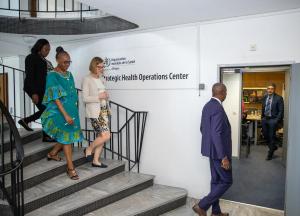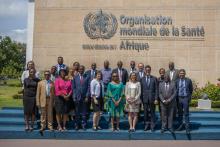Canada, WHO Africa seek stronger collaboration
Canada’s Minister for International Development, Honourable Karina Gould, held talks with World Health Organization (WHO) Regional Director for Africa, Dr Matshidiso Moeti, on ways to strengthen collaboration in the area of health while on a visit this week to the regional office in Brazzaville, Republic of the Congo.
During the courtesy call, Minister Gould toured the Strategic Health Operations Centre – the nerve centre of emergency operations at WHO Africa Office – and discussed with senior WHO leadership about health emergencies and the ongoing Ebola and measles outbreaks in the Democratic Republic of the Congo (DRC).
This week, Canada announced Can$ 56 million to help partners in the DRC fight Ebola, strengthen health systems and provide humanitarian assistance.
“Canada’s partnership with the World Health Organization and our African partners is helping to respond to health emergencies and improving access to health services for Africans. We stand with the health workers who are responding to the multiple outbreaks in the DRC. We know it has been a particularly challenging time for the communities, health workers, WHO and other partners who have responded to the crisis,” said Minister Gould.
In 2019, the Public Health Emergency of Canada deployed 15 experts to WHO Regional Office in Brazzaville and to the DRC for the Ebola outbreak. In the same year, Canada also supported relief efforts after Cyclones Idai and Kenneth in Mozambique, and has been a strong WHO partner in assisting people affected by complex humanitarian emergencies such as in the Sahel and South Sudan.
“We are keen to strengthen the partnership with Canada to improve the health of women and children in the region, as well as preventing and responding to emergencies, including humanitarian crises, and strengthening primary health care to achieve universal health coverage,” said Dr Moeti.
The support of Canada, other donors and partners has brought Africa closer to becoming free of wild polio virus in what is set to be a major public health success. The last case of wild polio was detected in Nigeria in 2016 and no cases have been reported since. The region is on track to be certified to have eradicated wild polioviruses by mid-2020.
“This achievement would not have been possible without the support of partners, including Canada,” noted Dr Moeti.
In 2018–2019, WHO in Africa received US$ 33.7 million from Canada which mainly funded emergency operations including polio eradication in Nigeria and response to the cyclones in Mozambique. And between 2013 and 2016 Canada funded programmes to improve malnutrition in 11 Africa countries.




